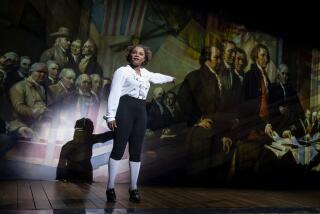Jefferson Was Not an Airplane : PATRIOTS The Men Who Started the American Revolution<i> by A.J. Langguth (Simon & Schuster: $22.95; 637 pp.) </i>
- Share via
For those, including this writer, who have decried the mushification of American history, A. J. Langguth has provided a spicy, toothsome respite. In “Patriots,” Langguth gives the making and winning of the American Revolution in all its glory, gore and mortal frailty.
In that sense “Patriots” is welcome even for those of us with an established addiction to history. It draws us back to the beginning of ours, an era that seldom receives the attention it deserves.
All the main characters are there: Franklin; Washington; Henry; Jefferson; the Adamses--Sam, John and Abigail; not to mention a good handful of the British players such as Cornwallis, Burgoyne, Howe, and particularly the rigid, aristocratic royal governor of Massachusetts, Thomas Hutchison, who may have done more to bring on the revolution than Sam Adams or George III.
Langguth is compellingly honest about his intentions. This book, he says, was written for readers “who knew that Washington had crossed the Delaware, but didn’t know why; that Arnold had betrayed his country, but didn’t know how.”
He is perhaps too modest. Those who know and well understand much more than Langguth can recount in his single volume will still find his account a lively and thought-provoking refresher. The swelling horde of young people who associate Arnold with Schwarzenegger and Jefferson with Airplane and are quite sure that Thomas and Benedict are “boooring” might well find “Patriots” an intriguing road home to their birthright as Americans.
Which is to say, “Parents. Buy it. Read it. Then place it under the nose of your hormone-crazed adolescent.”
What Langguth does, quite simply, is to make the events and particularly the characters interesting. He does it by making them human without wallowing in the crowded slough of debunkery. He seems to understand that all greatness is not bunk, that men can be both heroic and frail, and that the interweaving of fact and myth produces a delicate fabric that ought to be examined with care as well as precision.
He tells us that Nathan Hale probably never said that he regretted having but one life to give for his country, and that Patrick Henry did not defy his critics with “If this be treason, make the most of it!” But his narrative makes clear that the apocryphal words are true to the lives of the two men and to those dramatic moments on the gallows in New York and the floor of the Burgesses in Williamsburg.
The reader comes to understand both the how and why of Arnold’s betrayal without any temptation to condone it; others suffered similar humiliations, frustrations and temptations without yielding. One can even conclude that Arnold’s contributions to the Revolution before he turned traitor far outweighed any damage he did later, and still wish he had been captured and hanged.
We see Washington as a less brilliant strategist and a more ambitious public servant than is generally understood. (He struck the words “final” and “ultimate” from his 1783 farewell to public life.) Still, respect remains for that iron will, abhorrence of autocracy and modest dignity that preserved a people’s army and a representative government.
“Patriots” does have a flaw, and it is not insubstantial. Reliance on secondary sources leaves it subject to their shortcomings. Most notable is its preoccupation with Boston and activities within a few hundred miles of that area, to the virtual exclusion of events in most of Virginia, the Carolinas, Georgia and the frontier. The march of George Rogers Clark and his starving, freezing men on Ft. Vincennes, an episode unequaled for stark heroism in the history of this nation or any other, is ignored. As is the bloody, chaotic civil war of ambush and irregulars that marked most of the war south and west of Pennsylvania. (This is particularly surprising in light of Langguth’s statement that the idea for “Patriots” emerged from his experience as a journalist in Vietnam and a comparison of the tactics of the NLF with those of the Americans in the 1770s.)
Though difficult to capture in such a broad-brush treatment, those events were an essential part of the making of the Revolution and the nation. Indeed, there is enough there for another complete book. Perhaps Langguth can be persuaded to write it.
More to Read
Sign up for our Book Club newsletter
Get the latest news, events and more from the Los Angeles Times Book Club, and help us get L.A. reading and talking.
You may occasionally receive promotional content from the Los Angeles Times.










